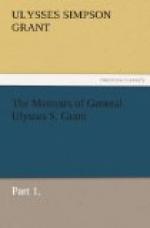We had not occupied this position long when it was discovered that our ammunition was growing low. I volunteered to go back (2) to the point we had started from, report our position to General Twiggs, and ask for ammunition to be forwarded. We were at this time occupying ground off from the street, in rear of the houses. My ride back was an exposed one. Before starting I adjusted myself on the side of my horse furthest from the enemy, and with only one foot holding to the cantle of the saddle, and an arm over the neck of the horse exposed, I started at full run. It was only at street crossings that my horse was under fire, but these I crossed at such a flying rate that generally I was past and under cover of the next block of houses before the enemy fired. I got out safely without a scratch.
At one place on my ride, I saw a sentry walking in front of a house, and stopped to inquire what he was doing there. Finding that the house was full of wounded American officers and soldiers, I dismounted and went in. I found there Captain Williams, of the Engineer Corps, wounded in the head, probably fatally, and Lieutenant Territt, also badly wounded his bowels protruding from his wound. There were quite a number of soldiers also. Promising them to report their situation, I left, readjusted myself to my horse, recommenced the run, and was soon with the troops at the east end. Before ammunition could be collected, the two regiments I had been with were seen returning, running the same gauntlet in getting out that they had passed in going in, but with comparatively little loss. The movement was countermanded and the troops were withdrawn. The poor wounded officers and men I had found, fell into the hands of the enemy during the night, and died.
While this was going on at the east, General Worth, with a small division of troops, was advancing towards the plaza from the opposite end of the city. He resorted to a better expedient for getting to the plaza—the citadel—than we did on the east. Instead of moving by the open streets, he advanced through the houses, cutting passageways from one to another. Without much loss of life, he got so near the plaza during the night that before morning, Ampudia, the Mexican commander, made overtures for the surrender of the city and garrison. This stopped all further hostilities. The terms of surrender were soon agreed upon. The prisoners were paroled and permitted to take their horses and personal property with them.
My pity was aroused by the sight of the Mexican garrison of Monterey marching out of town as prisoners, and no doubt the same feeling was experienced by most of our army who witnessed it. Many of the prisoners were cavalry, armed with lances, and mounted on miserable little half-starved horses that did not look as if they could carry their riders out of town. The men looked in but little better condition. I thought how little interest the men before me had in the results of the war, and how little knowledge they had of “what it was all about.”




